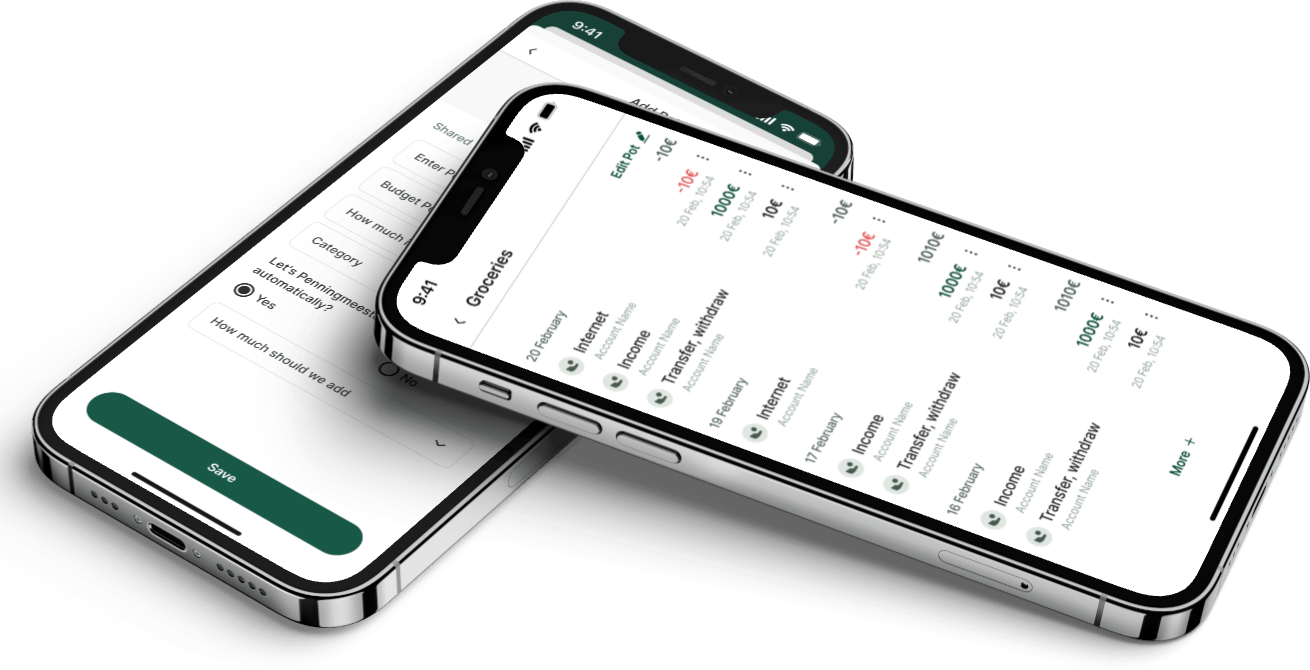The Emotional and Financial Shift of New Parenthood
There’s a moment, sometimes quiet, sometimes chaotic, when you realize life has changed forever. Maybe it’s the first time you see that little heartbeat flicker on a screen. Or the moment the baby kicks. Or that first night home, when you’re holding a tiny, blinking human and thinking, “I’m responsible for all of this.”
It’s overwhelming. It’s magical. And it’s expensive.
That last part no one really prepares you for.
So that’s what we’re going to do in this post.
We’re not here to scare you with numbers. We’re here to show you how to plan with more confidence, adjust when the numbers shift, and build a budget that supports you through the messy, beautiful reality of raising a child.

It’s easy to spend a sh*tload of money…
No judgment. The baby’s not even here yet and you’ve already got 14 tabs open for the “best” stroller, half of them over €1,000.
Let’s break it down:
-
Stroller – €1,200 for the newest Bugaboo (we get it, it folds like magic and comes in matte black)
-
Baby clothes: Round 1 – €400 easy, because look at those tiny suspenders
-
Baby clothes: Round 2 – they grow faster than you can say “3–6 months”
-
Formula – €20/week if breastfeeding’s not the path (We’re not judging. We’re just budgeting.)
-
Diapers – €50–70/month (aka a small subscription to poop containment)
-
Baby gear – crib, monitor, car seat, that bottle warmer TikTok swore by… easily €1,000+
-
Nursery – you’re gonna be quite sorry that last Rutte government didn’t make it to end when you’ve got €1,400 a month nursery bills coming your way
Basically, the first year can cost you €10,000–15,000, if you’re not careful.

Now here’s how you bring those baby costs down (without suffering):
Buy a second- or third-hand Joolz or Bugaboo — should be around €150, tops.
The baby won’t care that it’s not mint-condition. Your wallet will.Skip the boutique baby onesies.
Look for large bundles on Vinted or Marktplaats — not the one-off designer rompers, but those “12-for-€10” Petit Bateau stacks from parents who just want the stuff gone.
Way cheaper. Way less stress. And when it’s filled with poop you’re gonna feel real happy you paid just €1 and you can throw this one away without guilt.”Formula feeding?
According to Keuringsdienst van Waarde, Kruidvat’s baby formula is the same quality as Nutrilon — but half the price.
(And hey, if you still prefer Nutrilon, we get it. No judgment. Just options.)Kruidvat diapers? Cheap and still do the job. And if they don’t? Buy bulk and buy deals. If the pampers you are buying are more than half price, you are paying too much.
Ditch the showroom gear.
Instead of turning your living room into a Pinterest nursery, ask friends for gifts you’ll actually use, like a baby bath or sleeping bag, not 20 books your kid won’t read for years. (Or ever)
It’s more helpful. And way easier to store.Track the chaos — even if you call the category “emergency pizza and wipes”
And when you see something on Instagram that looks awesome and definite must-have? Use our impulse buy check tool before your click order. That’s how a €12k baby year becomes something closer to €6–7k, and you still get to keep your sanity (and maybe your Netflix subscription too).
The Costs Start Earlier Than You Think
Even before the baby arrives, your budget starts stretching in new directions.
There are doctor visits, supplements, and prenatal classes. You might be preparing for maternity or paternity leave, figuring out how to cover gaps in income. You’re Googling things like “what does baby insurance even mean in the Netherlands?”
These aren’t just purchases. They’re signals that your financial life is about to look very different.
And once the baby arrives? That difference becomes constant.
If one partner reduces hours or steps out of the workforce temporarily, your household income might drop just as expenses climb.
This is when most new parents ask:
How are we supposed to make this work?
Some Truth: You Can’t Budget for Everything
Before the baby, your budget reflected you. Your lifestyle. Your choices. If you wanted to splurge on a fancy dinner or skip groceries for a week, you could.
Now, even small decisions feel heavier.
Do we really need that name-brand formula? Can we afford that night nurse? What if we need to replace the pram? Is it okay to still spend money on ourselves?
You go from feeling financially independent to double-checking every purchase. Not because you’re irresponsible, but because the stakes feel higher. Your priorities have changed. You’re still you, but now you’re also a provider, protector, and planner for someone who can’t even hold their head up yet.
That’s not just about money. That’s about identity. And it’s okay if that takes time to settle.
In will become easier you understand exactly what you will receive when you take additional parental leave – and did you know that if you work freelance you could also get support from the government?
It’s Not Just a Budget Shift. It’s an Identity Shift.
Let’s say this now so it sticks:
You will forget something. You will overspend. And it doesn’t make you bad with money.
No budget survives a newborn untouched. You’ll buy that fancy sleep gadget and realize they prefer your chest. You’ll stock up on organic baby shampoo only to find out your kid breaks out in hives from all of them. You’ll burn through your “maternity leave grocery fund” on last-minute takeout because you’re too tired to cook.
This is all normal.
That’s why the best budgeting mindset isn’t “perfect plan.”
It’s a “resilient system.”
Start by tracking, not fixing. What’s coming in? What’s going out? Where are the surprises? Label things honestly, even if that means a category called “emergency coffee and snacks.”
You’re not budgeting to restrict. You’re budgeting to adapt.

You’re not falling behind. You’re becoming someone new. And your financial system is catching up.
How to Start Rebuilding a Budget That Works for You (and Them)
Here’s a framework to help you reset without overwhelm:
Map your fixed costs
Start with what won’t change: rent/mortgage, utilities, insurance, and debt repayments. This is also a great moment to audit your subscriptions.Add in baby-specific expenses
Diapers, formula, clothes, medical appointments, parental leave buffers. Don’t underestimate how quickly “small” items stack up.Budget for transition costs
This includes increased groceries, heating bills, transport changes, missed income during leave, or one-off purchases like baby gear.Protect your basics
Keep your essentials: a few nice meals, a streaming subscription, and your mental health budget. Removing every joy item makes the process harder, not better.Create a “new life” buffer
Even €100/month labeled “baby chaos” gives you room to breathe. Unexpected pharmacy runs or last-minute babysitting will happen.Track for 2–3 months without judging
Let the data show you what needs adjusting. Then recalibrate slowly.
Some new parents do this in Excel. Others prefer paper and pen. And if you want something that tracks trends and nudges you when spending patterns change, apps like Nero Budget are there too. Want to start low key, free and with some guidance? You our free budget setup tool to create your first budget.
Give Yourself Grace, You’re Doing More Than You Think
Parenting isn’t linear. Neither is budgeting during this phase.
You’ll have weeks when it all clicks. You’ll have days where nothing adds up. And through all of it, you’re still building something beautiful and long-lasting, even when it doesn’t look tidy.
There’s no “right” way to financially prepare for a child. There’s only the right amount of awareness, honesty, and flexibility for your situation.
So, check in with your budget often. But also check in with yourself.
If you’re tired, let the spreadsheet wait. If you’re overwhelmed, pause the tracking for a day. If you’re spending more than planned, acknowledge it, adjust next month, and move on.
You’re not falling behind. You’re becoming someone new. And your financial system is catching up.
Final Thoughts: Build Something That Grows With You

Take it slow. Be kind. Stay flexible.
You’re doing something extraordinary.
Your baby isn’t the only thing growing.
You are, too.
This phase isn’t about getting everything right. It’s about staying present, adjusting as you go, and building a financial life that matches your new reality, not your old one.
So, whether you budget with a pen, a spreadsheet, or an app, what matters is that it gives you enough peace to sleep at night (even if sleep is in 45-minute chunks).
Take it slow. Be kind. Stay flexible.
You’re doing something extraordinary.
And your budget? It doesn’t need to be perfect.
It just needs to work with you.
Ready to build a budget that actually works, even in the chaos of new parenthood?
Nero Budget helps new parents track spending, spot savings, and stay one step ahead; without spreadsheets or stress.
Start with our free budget setup tool to create your first budget or try out Nero Budget today, with your 30-day-no-questions-asked money back guarantee.





